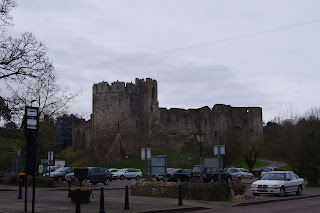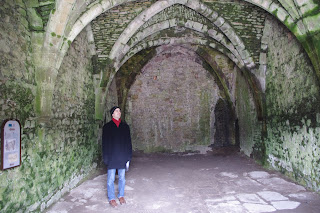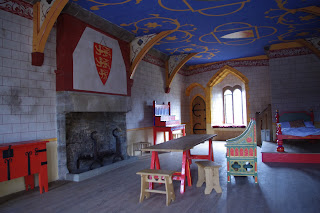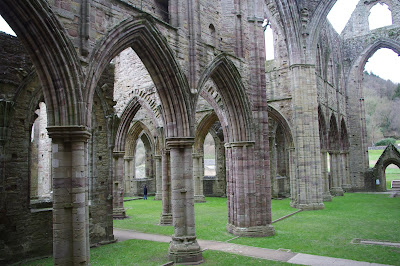 |
| Chepstow Castle. |
We went to Chepstow in order to get to Tintern Abbey, a longtime goal of mine. Chepstow itself was lovely, with a friendly tourist office and a very pretty ruined castle, which originally dates to the Norman conquest of the 11th century, but which was heavily reconstructed in the 13th century. One of the rooms had been redecorated and furnished as though it were made for a giant child from a futuristic twelfth-century. Quite bizarre. We got our first up-close glimpse of the River Wye there, and then headed out toward perhaps the most rickety bus I've ever seen. It was quite adorable and held about ten people.
 |
| Wine cellar, Chepstow Castle. |
 |
| A gaudily-decorated bedroom. |
 |
| The River Wye. |
 |
| "The Hotel Conneaut of Wales." |
We had lunch across the street from the abbey in a hotel that reminded us of the Hotel Conneaut. They thought our accents were funny and didn't know if we were French or American. The waitress also thought it was totally bizarre that I would ask if there was meat in the baked beans that were to adorn my baked potato. I explained that in America, people almost always put bacon in the beans. She just shook her head like we were insane. After our lunch of enormous portions, we braved the cold, misty day to explore the ruins of Tintern Abbey, an old Cistercian establishment. It was founded in the 12th century and a huge Gothic church was added in the 13th century. As part of Henry VIII's break from the Catholic church in the 1500s, all monasteries in England were dissolved and their property confiscated by the crown, leading to Tintern's ruined state today. There weren't a whole lot of other tourists there since it was a cold winter day, but we enjoyed exploring all the more. We read every plaque there and even bought the explanatory guide book.
The visit starts out with a collection of ruins from the abbey, including some headless figurines and detailed motifs. Then we went through every room at least twice. I of course had to read Wordsworth's famous "Lines Composed a Few Miles above Tintern Abbey" since that was the inspiration for the whole trip. I copied (legally because the copyright's been out of date for quite some time now!) the text below in case you want to read it yourself as you look at the beautiful abbey in pictures. I didn't feel too self-conscious because there weren't many people around. They even sold the poem for those who forgot to bring their own copy! When it finally got too cold to stay anymore, we decided to get a cup of tea. Instead, I changed my mind and ran back to get more pictures.
(Aaron's note: Lisa was happier at Tintern than I've ever seen her, outside of our wedding day.) Then we hopped back on the rickety bus and went back to Chepstow where we visited an antique store and had our tea.
 |
| Lisa reading Wordsworth. |
We enjoyed the peace and quiet of the small town for a bit and then got on the train to Cardiff, where we had a delicious dinner of tapas, ending with churros for Aaron--the first crispy ones he's had in Europe! We picked up our bags at the hotel and went on to the airport hotel. On the airport bus, we met a very friendly drunk rugby fan who told us what a great bus it was. Then we had a nice night's sleep.
LINES COMPOSED A FEW MILES ABOVE TINTERN ABBEY, ON REVISITING THE BANKS OF THE WYE DURING A TOUR. JULY 13, 1798
 FIVE years have past; five summers, with the length
Of five long winters! and again I hear
These waters, rolling from their mountain-springs
With a soft inland murmur.--Once again
Do I behold these steep and lofty cliffs,
That on a wild secluded scene impress
Thoughts of more deep seclusion; and connect
The landscape with the quiet of the sky.
The day is come when I again repose
Here, under this dark sycamore, and view
FIVE years have past; five summers, with the length
Of five long winters! and again I hear
These waters, rolling from their mountain-springs
With a soft inland murmur.--Once again
Do I behold these steep and lofty cliffs,
That on a wild secluded scene impress
Thoughts of more deep seclusion; and connect
The landscape with the quiet of the sky.
The day is come when I again repose
Here, under this dark sycamore, and view
 These plots of cottage-ground, these orchard-tufts,
Which at this season, with their unripe fruits,
Are clad in one green hue, and lose themselves
'Mid groves and copses. Once again I see
These hedge-rows, hardly hedge-rows, little lines
Of sportive wood run wild: these pastoral farms,
Green to the very door; and wreaths of smoke
Sent up, in silence, from among the trees!
With some uncertain notice, as might seem
Of vagrant dwellers in the houseless woods,
Or of some Hermit's cave, where by his fire
The Hermit sits alone.
These beauteous forms,
Through a long absence, have not been to me
These plots of cottage-ground, these orchard-tufts,
Which at this season, with their unripe fruits,
Are clad in one green hue, and lose themselves
'Mid groves and copses. Once again I see
These hedge-rows, hardly hedge-rows, little lines
Of sportive wood run wild: these pastoral farms,
Green to the very door; and wreaths of smoke
Sent up, in silence, from among the trees!
With some uncertain notice, as might seem
Of vagrant dwellers in the houseless woods,
Or of some Hermit's cave, where by his fire
The Hermit sits alone.
These beauteous forms,
Through a long absence, have not been to me
As is a landscape to a blind man's eye:
But oft, in lonely rooms, and 'mid the din
Of towns and cities, I have owed to them
In hours of weariness, sensations sweet,
Felt in the blood, and felt along the heart;
And passing even into my purer mind,
With tranquil restoration:--feelings too
Of unremembered pleasure: such, perhaps,
As have no slight or trivial influence
On that best portion of a good man's life,
His little, nameless, unremembered, acts
Of kindness and of love. Nor less, I trust,
To them I may have owed another gift,
Of aspect more sublime; that blessed mood,
In which the burthen of the mystery,
In which the heavy and the weary weight
Of all this unintelligible world,
Is lightened:--that serene and blessed mood,
In which the affections gently lead us on,--
Until, the breath of this corporeal frame
And even the motion of our human blood
Almost suspended, we are laid asleep
In body, and become a living soul:
While with an eye made quiet by the power
Of harmony, and the deep power of joy,
We see into the life of things.
If this
Be but a vain belief, yet, oh! how oft--
In darkness and amid the many shapes
Of joyless daylight; when the fretful stir
Unprofitable, and the fever of the world,
Have hung upon the beatings of my heart--
How oft, in spirit, have I turned to thee,
O sylvan Wye! thou wanderer thro' the woods,
How often has my spirit turned to thee!
And now, with gleams of half-extinguished thought,
With many recognitions dim and faint,
And somewhat of a sad perplexity,
The picture of the mind revives again:
While here I stand, not only with the sense
Of present pleasure, but with pleasing thoughts
That in this moment there is life and food
For future years. And so I dare to hope,
Though changed, no doubt, from what I was when first
|
Cupboards in the refectory. |
I came among these hills; when like a roe
I bounded o'er the mountains, by the sides
Of the deep rivers, and the lonely streams,
Wherever nature led: more like a man
Flying from something that he dreads, than one
Who sought the thing he loved. For nature then
(The coarser pleasures of my boyish days,
And their glad animal movements all gone by)
To me was all in all.--I cannot paint
What then I was. The sounding cataract
Haunted me like a passion: the tall rock,
The mountain, and the deep and gloomy wood,
Their colours and their forms, were then to me
An appetite; a feeling and a love,
That had no need of a remoter charm,
By thought supplied, nor any interest
Unborrowed from the eye.--That time is past,
And all its aching joys are now no more,And all its dizzy raptures. Not for this
Faint I, nor mourn nor murmur, other gifts
Have followed; for such loss, I would believe,
Abundant recompence. For I have learned
To look on nature, not as in the hour
Of thoughtless youth; but hearing oftentimes
The still, sad music of humanity,
Nor harsh nor grating, though of ample power
To chasten and subdue. And I have felt
A presence that disturbs me with the joy
Of elevated thoughts; a sense sublime
Of something far more deeply interfused,
Whose dwelling is the light of setting suns,
And the round ocean and the living air,
And the blue sky, and in the mind of man;
A motion and a spirit, that impels
All thinking things, all objects of all thought,
And rolls through all things. Therefore am I still
A lover of the meadows and the woods,
And mountains; and of all that we behold
From this green earth; of all the mighty world
Of eye, and ear,--both what they half create,
And what perceive; well pleased to recognise
In nature and the language of the sense,
The anchor of my purest thoughts, the nurse,
The guide, the guardian of my heart, and soul
Of all my moral being.
Nor perchance,
If I were not thus taught, should I the more
Suffer my genial spirits to decay:For thou art with me here upon the banks
Of this fair river; thou my dearest Friend,
My dear, dear Friend; and in thy voice I catch
The language of my former heart, and read
My former pleasures in the shooting lights
 Of thy wild eyes. Oh! yet a little while
May I behold in thee what I was once,
My dear, dear Sister! and this prayer I make,
Knowing that Nature never did betray
The heart that loved her; 'tis her privilege,
Through all the years of this our life, to lead
From joy to joy: for she can so inform
The mind that is within us, so impress
With quietness and beauty, and so feed
With lofty thoughts, that neither evil tongues,
Rash judgments, nor the sneers of selfish men,
Nor greetings where no kindness is, nor all
The dreary intercourse of daily life,
Shall e'er prevail against us, or disturb
Our cheerful faith, that all which we behold
Is full of blessings. Therefore let the moon
Shine on thee in thy solitary walk;
And let the misty mountain-winds be free
To blow against thee: and, in after years,
When these wild ecstasies shall be matured
Of thy wild eyes. Oh! yet a little while
May I behold in thee what I was once,
My dear, dear Sister! and this prayer I make,
Knowing that Nature never did betray
The heart that loved her; 'tis her privilege,
Through all the years of this our life, to lead
From joy to joy: for she can so inform
The mind that is within us, so impress
With quietness and beauty, and so feed
With lofty thoughts, that neither evil tongues,
Rash judgments, nor the sneers of selfish men,
Nor greetings where no kindness is, nor all
The dreary intercourse of daily life,
Shall e'er prevail against us, or disturb
Our cheerful faith, that all which we behold
Is full of blessings. Therefore let the moon
Shine on thee in thy solitary walk;
And let the misty mountain-winds be free
To blow against thee: and, in after years,
When these wild ecstasies shall be matured

Into a sober pleasure; when thy mind
Shall be a mansion for all lovely forms,
 Thy memory be as a dwelling-place
For all sweet sounds and harmonies; oh! then,
If solitude, or fear, or pain, or grief,
Should be thy portion, with what healing thoughts
Of tender joy wilt thou remember me,
And these my exhortations! Nor, perchance--
If I should be where I no more can hear
Thy voice, nor catch from thy wild eyes these gleams
Of past existence--wilt thou then forget
That on the banks of this delightful stream
We stood together; and that I, so long
A worshipper of Nature, hither came
Thy memory be as a dwelling-place
For all sweet sounds and harmonies; oh! then,
If solitude, or fear, or pain, or grief,
Should be thy portion, with what healing thoughts
Of tender joy wilt thou remember me,
And these my exhortations! Nor, perchance--
If I should be where I no more can hear
Thy voice, nor catch from thy wild eyes these gleams
Of past existence--wilt thou then forget
That on the banks of this delightful stream
We stood together; and that I, so long
A worshipper of Nature, hither came
Unwearied in that service: rather say
With warmer love--oh! with far deeper zeal
Of holier love. Nor wilt thou then forget,
That after many wanderings, many years
Of absence, these steep woods and lofty cliffs,
And this green pastoral landscape, were to me
More dear, both for themselves and for thy sake! 1798.






FIVE years have past; five summers, with the length Of five long winters! and again I hear These waters, rolling from their mountain-springs With a soft inland murmur.--Once again Do I behold these steep and lofty cliffs, That on a wild secluded scene impress Thoughts of more deep seclusion; and connect The landscape with the quiet of the sky. The day is come when I again repose Here, under this dark sycamore, and view
These plots of cottage-ground, these orchard-tufts, Which at this season, with their unripe fruits, Are clad in one green hue, and lose themselves 'Mid groves and copses. Once again I see These hedge-rows, hardly hedge-rows, little lines Of sportive wood run wild: these pastoral farms, Green to the very door; and wreaths of smoke Sent up, in silence, from among the trees! With some uncertain notice, as might seem Of vagrant dwellers in the houseless woods, Or of some Hermit's cave, where by his fire The Hermit sits alone. These beauteous forms, Through a long absence, have not been to me
Of thy wild eyes. Oh! yet a little while May I behold in thee what I was once, My dear, dear Sister! and this prayer I make, Knowing that Nature never did betray The heart that loved her; 'tis her privilege, Through all the years of this our life, to lead From joy to joy: for she can so inform The mind that is within us, so impress With quietness and beauty, and so feed With lofty thoughts, that neither evil tongues, Rash judgments, nor the sneers of selfish men, Nor greetings where no kindness is, nor all The dreary intercourse of daily life, Shall e'er prevail against us, or disturb Our cheerful faith, that all which we behold Is full of blessings. Therefore let the moon Shine on thee in thy solitary walk; And let the misty mountain-winds be free To blow against thee: and, in after years, When these wild ecstasies shall be matured
Thy memory be as a dwelling-place For all sweet sounds and harmonies; oh! then, If solitude, or fear, or pain, or grief, Should be thy portion, with what healing thoughts Of tender joy wilt thou remember me, And these my exhortations! Nor, perchance-- If I should be where I no more can hear Thy voice, nor catch from thy wild eyes these gleams Of past existence--wilt thou then forget That on the banks of this delightful stream We stood together; and that I, so long A worshipper of Nature, hither came







No comments:
Post a Comment